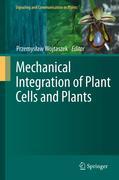
Chemical reactions and interactions between molecules are commonly consideredthe basis of life, and thus the biochemical nature of cells and organisms is relatively well recognized. Research conducted in recent years, however, increasingly indicates that physical forces profoundly affect the functioning of life at all levels of its organization. To detect and to respond to such forces,plant cells and plants need to be structured mechanically. This volume focuses on mechanical aspects of plant life. It starts with a consideration of the mechanical integration of supracellular structures and mechanical properties ofcellular building blocks to show how the structural integrity of plant cells is achieved and maintained during growth and development. The following chapters reveal how the functioning of integrated plant cells contributes to the mechanical integration of plants, and how the latter are able to detect physical stimuli and to reorganize their own cells in response to them. The mechanical aspects of plant responses to stresses are also presented. Finally, all these aspects are placed in an evolutionary context. Up-to-date knowledge on mechanical aspects of plant life functioning. Gives an overview of the role played by mechanical forces and signals in plant cells and whole plant growth. Covers all levels of plant hierarchical organisation, providing direct or indirect evidence for the organismal nature of those organisms. INDICE: Introduction: Tensegral World of Plants. Micromechanics of Cell Walls. Mechanics of the Cytoskeleton. Intracellular Movement. Integration at theCellular Level as Reflected in the Organization of Organelle Movements. Generating a Cellular Protuberance. Mechanics of Tip Growth. Mechanics of the Meristems. Mechanical Force Responses of Plant Cells and Plants. Mechanical Aspectsof Gravity-Controlled Growth, Development and Morphogenesis. Osmosensing. Plants as Mechano-Osmotic Transducers. Integrative Mechanobiology of Growth and Architectural Development in Fluctuating Mechanical Environments. Hydraulics ofVascular Water Transport. MicroRNAs and Mechanical Stress.
- ISBN: 978-3-642-19090-2
- Editorial: Springer Berlin Heidelberg
- Encuadernacion: Cartoné
- Páginas: 405
- Fecha Publicación: 01/06/2011
- Nº Volúmenes: 1
- Idioma: Inglés
